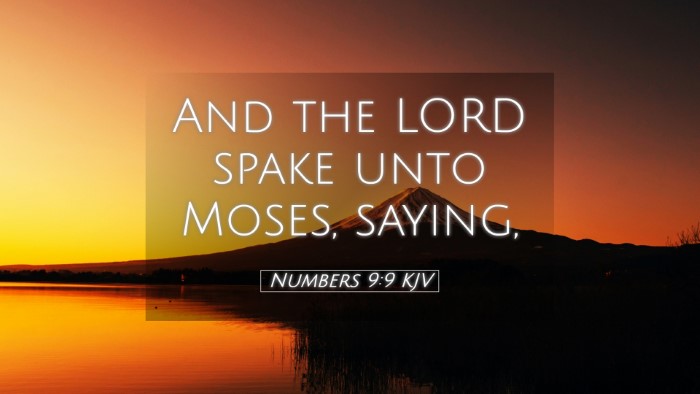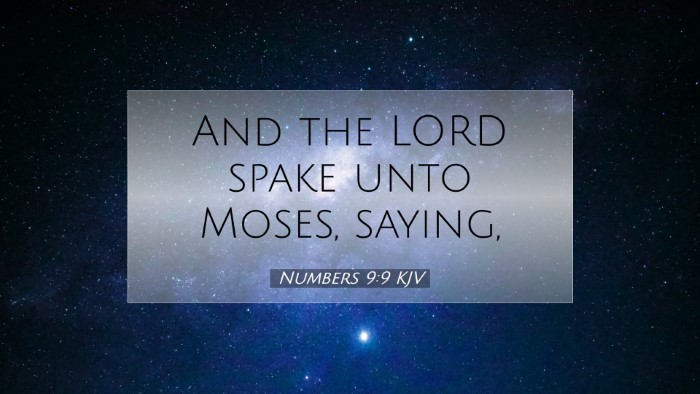Commentary on Numbers 9:9
Introduction
The verse of interest, Numbers 9:9, presents God’s instructions to Moses regarding individuals who are unintentionally unable to observe the Passover due to circumstances beyond their control. This passage is crucial, as it reflects God’s justice, mercy, and desire for inclusiveness within the covenant community of Israel.
Text of Numbers 9:9
"And the LORD spake unto Moses, saying..."
Commentary Overview
This commentary synthesizes insights from public domain sources, notably from the writings of Matthew Henry, Albert Barnes, and Adam Clarke, to provide a comprehensive exploration of this verse’s meaning and implications.
Contextual Background
The context of Numbers 9 lies in the narrative of Israel's journey through the wilderness following their Exodus from Egypt. The Israelites are given instructions about the observance of the Passover, which commemorates their deliverance from slavery. This chapter reaffirms the significance of the Passover and delineates conditions under which individuals may refrain from partaking in it.
Insights from Matthew Henry
Henry emphasizes God’s considerate nature in providing provisions for those who, due to ceremonial uncleanness or distant travel, cannot participate in the religious observances. He notes:
- Inclusivity of Worship: God's commandments are meant to include the entire congregation. The establishment of provisions for those unable to celebrate acknowledges their reality, demonstrating God's broader view of community.
- Mercy in Justice: Henry points to God’s mercy that allows for a second chance for participation in the Passover, highlighting that divine law accommodates human frailty.
Thoughts from Albert Barnes
Barnes further elaborates on the implications of God’s instructions. He remarks that:
- Transferability of the Passover: Churches and religious communities should recognize the underlying principle of accommodating those who desire to partake in communal worship, thus embracing an understanding spirit.
- Ritual Purity: The necessity of ritual purity, as suggested by Barnes, not only influences participation but reflects the sacredness of approaching God, stressing the seriousness with which the covenant must be treated.
Reflections by Adam Clarke
Clarke provides a deeper theological interpretation by focusing on the character of God and His expectations of humanity:
- God's Grace: Clarke emphasizes that God’s provision for those unable to observe the Passover reflects His grace. The delayed opportunity to partake highlights the divine patience and understanding, inviting believers to approach Him despite their shortcomings.
- Community Responsibility: He asserts that the community has a role in supporting those who might otherwise be excluded, fostering an environment of encouragement and restoration.
Theological Implications
The theological implications of Numbers 9:9 encourage a reflective approach to worship and community life.
- Reflection on Holiness: While participation in holy observances is crucial, God values the hearts of the people more than mere external compliance to rituals.
- Encouragement for Pastoral Care: Pastors and church leaders are reminded of the need to provide pastoral care for those who feel excluded due to their circumstances.
Conclusion
Numbers 9:9 serves as a timeless reminder of God's grace and the need for an inclusive community of faith. As believers reflect on how they might better accommodate brethren who face circumstances preventing full participation in communal worship, they embody the heart of God manifest in this scripture.
In fostering an atmosphere of love, acceptance, and understanding, individuals and communities can live out the true essence of the Passover, celebrating together as God's people, unified in His grace and purpose.


